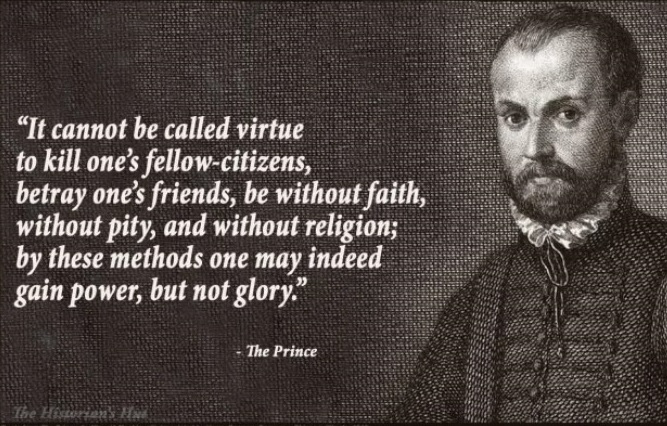
If rumors are to be believed, he was either the Devil Incarnate or one of the greatest political analysts of all time. In fact, some claim that the Devil is often referred to as Old Nick simply because Niccolò was Machiavelli’s first name. The term Machiavellian often connotes crafty plotting, deviousness and cunning. And yet, it is said that ‘for over 500 years, Niccolò Machiavelli’s masterpiece, The Prince, has been a basic handbook of politics, statesmanship and power.’ Machiavelli has also been hailed as the father of modern political analysis.
I think Machiavelli’s notoriety is due largely to the fact that people have based their judgments about him from hearsay rather than from a critical analysis of his work. Upon closer examination, you will find The Prince to be an astute treatise on founding a nation. I think what sets Machiavelli apart is the fact that he has a sober view of the human psyche. He minces no words, and he offers recommendations about what needs to be done.
It was he who said that “it must be considered that there is nothing more difficult to carry out, nor more doubtful of success, nor more dangerous to handle, than to initiate a new order of things. For the reformer has enemies in all those profit by the old order, and only lukewarm defenders in all those who would profit by the new order, this lukewarmness arising partly from the incredulity of mankind who do not truly believe in anything new until they have had actual experience of it.”
I think it would be very difficult to dispute Machiavelli’s perspective—whether you are a housewife training your kasambahay, a parent disciplining your children, a teacher managing a class or a businessperson or manager instituting new policies—the fact remains that initiating change is a painful process for all the parties involved, regardless of which side you are on. That’s why it needs to be handled with extreme care and caution.
He then goes on to say that it is necessary to examine whether these innovators can carry out their plans because they “must entreat others or are able to compel. In the first case, they invariably succeed ill, and accomplish nothing; but when they can depend on their own strength and are able to use force, they rarely fail. Thus, it comes about that all armed prophets have conquered, and unarmed ones failed; the character of people varies, and it is easy to persuade them of a thing, but difficult to keep them in that persuasion. And it is necessary to order things so that when they no longer believe, they can be made to believe by force.”
A lot of people are very offended by this perspective. I on the other hand, find this to be a true. For example, it is easy to tell a child that he needs to eat sweets in moderation but very difficult to make him remember that when faced with a bagful of party favors. That’s when regulations on food intake and its accompanying disciplinary measures become a necessity.
On a social context, entreating filmmakers to stop making pornographic films that promote sexual violence will do little to convince them as opposed to giving out fines and regulating viewership. In the same way, trying to convince serial killers, child molesters, rapists, and drug lords to mend their ways is taxing at best and futile at worse. Whereas the possibility of near and impending death mandated by law and meted out with a swift justice is a more powerful deterrent. That is why I believe that when the state takes life of a perpetrator of a heinous crime, it is not murder. That person’s criminal behavior of the worst kind has forfeited his right to live.
Say what you will, but Machiavelli’s The Prince, deserves to be read before it is judged.

